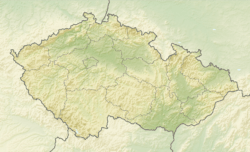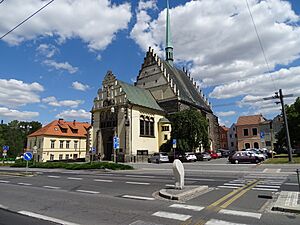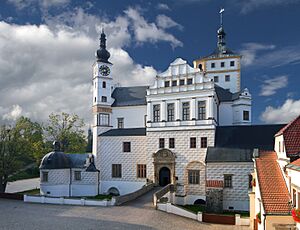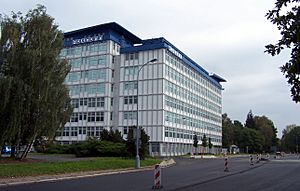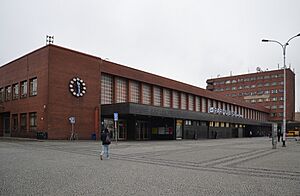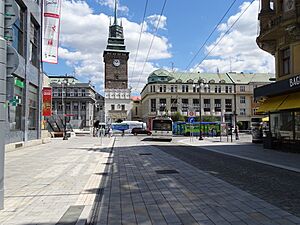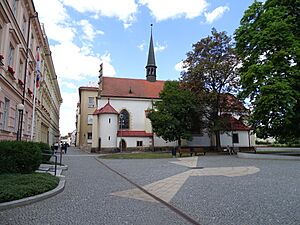Pardubice facts for kids
Quick facts for kids
Pardubice
|
|||
|---|---|---|---|
|
Statutory city
|
|||
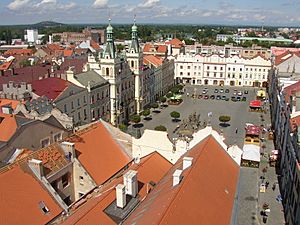
The main square as seen from the Green Tower
|
|||
|
|||
| Country | |||
| Region | Pardubice | ||
| District | Pardubice | ||
| First mentioned | 1295 | ||
| Area | |||
| • Total | 82.66 km2 (31.92 sq mi) | ||
| Elevation | 237 m (778 ft) | ||
| Population
(2024-01-01)
|
|||
| • Total | 92,362 | ||
| • Density | 1,117.37/km2 (2,893.98/sq mi) | ||
| Time zone | UTC+1 (CET) | ||
| • Summer (DST) | UTC+2 (CEST) | ||
| Postal code |
530 01
|
||
Pardubice is a cool city in the Czech Republic. It has about 92,000 people living there. Pardubice is the main city of the Pardubice Region and sits right on the Elbe River.
The old part of the city is really special. It is protected as an important historical area. Pardubice is also a big center for factories and businesses. It has an oil refinery and a plant that makes electronics.
The city is super famous for its sports events! These include the exciting Velká pardubická horse race, the Golden Helmet of Pardubice motorcycle race, and a big international chess and games festival called the Czech Open.
Contents
What's in a Name?
The name Pardubice comes from a Polish person's name, Porydęb. He was the leader of some monks who came to this area from Poland a long time ago. The name was first written down as Pordobice.
Where is Pardubice?
Pardubice is located about 90 kilometers (about 56 miles) east of Prague, the capital city. The city is built where two rivers meet: the Elbe River and the Chrudimka River.
You can find several fishponds and small lakes around the city. These include old parts of the Elbe River that have been cut off, called oxbow lakes. Pardubice is in a flat area called the East Elbe Table. The highest point nearby is Stropinský vrch hill, which is 258 meters (846 feet) above sea level.
Pardubice Weather
| Climate data for Pardubice (Pardubice Airport) (1991–2020) | |||||||||||||
|---|---|---|---|---|---|---|---|---|---|---|---|---|---|
| Month | Jan | Feb | Mar | Apr | May | Jun | Jul | Aug | Sep | Oct | Nov | Dec | Year |
| Record high °C (°F) | 16.5 (61.7) |
18.2 (64.8) |
22.5 (72.5) |
29.3 (84.7) |
34.4 (93.9) |
36.6 (97.9) |
37.7 (99.9) |
37.6 (99.7) |
33 (91) |
26.3 (79.3) |
19.6 (67.3) |
14.7 (58.5) |
37.7 (99.9) |
| Mean daily maximum °C (°F) | 2.6 (36.7) |
4.7 (40.5) |
9.4 (48.9) |
15.7 (60.3) |
20.3 (68.5) |
23.5 (74.3) |
25.7 (78.3) |
25.7 (78.3) |
20.2 (68.4) |
14.3 (57.7) |
8 (46) |
3.6 (38.5) |
14.5 (58.1) |
| Daily mean °C (°F) | −0.3 (31.5) |
0.9 (33.6) |
4.5 (40.1) |
9.7 (49.5) |
14.5 (58.1) |
18.1 (64.6) |
19.8 (67.6) |
19.4 (66.9) |
14.4 (57.9) |
9.4 (48.9) |
4.8 (40.6) |
0.9 (33.6) |
9.7 (49.5) |
| Mean daily minimum °C (°F) | −3.9 (25.0) |
−3.2 (26.2) |
−0.3 (31.5) |
3.1 (37.6) |
7.8 (46.0) |
11.5 (52.7) |
13.1 (55.6) |
12.7 (54.9) |
8.7 (47.7) |
4.7 (40.5) |
1.2 (34.2) |
−2.5 (27.5) |
4.4 (39.9) |
| Record low °C (°F) | −25.6 (−14.1) |
−22 (−8) |
−15.4 (4.3) |
−7 (19) |
−2.8 (27.0) |
1.2 (34.2) |
5.7 (42.3) |
5.1 (41.2) |
−0.8 (30.6) |
−8.2 (17.2) |
−10.5 (13.1) |
−27.7 (−17.9) |
−27.7 (−17.9) |
| Average precipitation mm (inches) | 35.2 (1.39) |
30.9 (1.22) |
39.2 (1.54) |
31.4 (1.24) |
59.3 (2.33) |
65.8 (2.59) |
79.9 (3.15) |
66.3 (2.61) |
53.4 (2.10) |
38.2 (1.50) |
35.5 (1.40) |
38.4 (1.51) |
573.4 (22.57) |
| Average precipitation days (≥ 1.0 mm) | 8.4 | 7.0 | 8.3 | 6.2 | 8.9 | 8.5 | 9.3 | 7.9 | 7.1 | 7.4 | 7.7 | 9.1 | 95.8 |
| Mean monthly sunshine hours | 49.7 | 75.0 | 125.0 | 180.1 | 211.2 | 209.2 | 221.1 | 224.6 | 164.7 | 107.7 | 52.8 | 39.4 | 1,660.4 |
| Source: NOAA | |||||||||||||
Pardubice Through Time
The first time Pardubice was mentioned in writing was in 1295. Back then, it was a church protected by Pope Boniface VIII. In the early 1300s, a noble family took over the area. They later became known as the Lords of Pardubice.
In 1340, when Arnošt of Pardubice inherited the land, Pardubice was first called a city. This was a big step for the settlement!
The Pernštejn Family's Influence
In 1491, a very important person named Vilém II of Pernštejn bought Pardubice. He helped the city grow a lot and made it very successful. He decided to make Pardubice the center of his large land. He built a city that matched his high status.
The Pernštejn family built the entire historic city center. This included the beautiful Renaissance square. They also turned the old medieval castle into a strong, comfortable home. But in 1560, they had to sell their lands to Emperor Ferdinand I because they had too many debts.
Later History
During the Thirty Years' War, a big army tried to take the city. But Pardubice was strong and was not captured!
A huge change happened in 1845 when a railway line was built. This connected Pardubice to Prague and Olomouc. Pardubice became a key railway hub. This helped industries like food, engineering, and chemicals grow. It also made social and cultural life in the city much better.
In 1874, the famous Velká pardubická horse race happened for the first time. In 1910, a brave pilot named Jan Kašpar made the first successful flight in the Czech lands right here. A year later, he made history again by flying from Pardubice to Prague!
Pardubice was part of Austria Hungary until 1918. It was an important district center.
The city kept growing between the two World Wars. But this growth slowed down when World War II began. During the war, the city was damaged by air attacks. The Fanto Werke oil refinery was bombed many times.
Pardubice Population
| Historical population | ||||||||||||||||||||||||||||||||||||||||||||||||||||||||
|---|---|---|---|---|---|---|---|---|---|---|---|---|---|---|---|---|---|---|---|---|---|---|---|---|---|---|---|---|---|---|---|---|---|---|---|---|---|---|---|---|---|---|---|---|---|---|---|---|---|---|---|---|---|---|---|---|
|
|
|
||||||||||||||||||||||||||||||||||||||||||||||||||||||
| Source: Censuses | ||||||||||||||||||||||||||||||||||||||||||||||||||||||||
Pardubice Businesses
Pardubice is well-known as a city with many factories. The main types of businesses here are chemical, electrical, and mechanical engineering.
The electronics company Tesla used to operate here from 1921 to 1989. In 2000, Foxconn opened a factory in the same place. This electronics maker is now the biggest employer in Pardubice.
Pardubice has a long history in the chemical industry. The Paramo refinery was started in 1889. Today, it is owned by Orlen Unipetrol. In Pardubice-Semtín, you'll find Explosia. This company makes explosives and was founded in 1920. They are famous for inventing the Semtex plastic explosive. Their sister company, Synthesia, makes things like dyes and other chemical compounds.
For hundreds of years, Pardubice has been famous for making gingerbread. The gingerbread makers even had their own guild in the 1500s. The first factory for gingerbread opened in 1913. Since 2008, Pardubice gingerbread has a special protection from the European Union. This means only gingerbread made here can use that name.
Getting Around Pardubice
Pardubice is a very important place for roads and trains. Three main roads meet here. One connects Pardubice to Prague. Another goes to Rychnov nad Kněžnou District. The third links Hradec Králové with Žďár nad Sázavou and the D1 motorway.
The Pardubice main railway station is a major train hub. You can take a direct train from Pardubice to many cities. These include Prague, Brno, Olomouc, Ostrava, and Liberec in the Czech Republic. You can also go to Bratislava, Žilina, and Košice in Slovakia. Trains also go to Budapest in Hungary, and Vienna and Graz in Austria. There are eight train stations and stops within the city area.
Pardubice also has its own airport, Pardubice Airport. It is used by both the military and for international flights.
To get around inside the city, you can use buses and trolleybuses. Trolleybuses are like electric buses that get power from overhead wires. They started running in 1952. Today, there are 12 trolleybus lines in Pardubice.
Learning in Pardubice
Pardubice is home to the University of Pardubice. This university started in 1950 as a Chemical College. It mainly focuses on subjects that are important to the city's history. These include the chemical industry and transportation.
Sports in Pardubice
Pardubice has a strong sports history! In football, SK Pardubice played in the top national league in the 1930s and 1940s. Later, VCHZ Pardubice also played in the top league. Today, FK Pardubice plays in the top Czech football league. There is also a women's team that plays in the top league.
The ice hockey team, HC Dynamo Pardubice, plays in the top Czech Extraliga. They play their home games at the Enteria arena.
The basketball team is BK JIP Pardubice. They play in the National Basketball League. Pardubice also has a team in the Czech rink bandy league.
Famous Sporting Events
Pardubice hosts two world-famous sports events every year.
- The Velká pardubická steeplechase is a horse race. It first happened in 1874. It is one of the most famous horse races in all of Europe!
- The Golden Helmet of Pardubice is a motorcycle speedway competition. It takes place at the Svítkov Stadium. This race has been held since 1929. It is one of the oldest individual speedway titles in the world. The speedway team AMK Zlatá Přilba Pardubice races at this stadium.
The Czech Open international chess and games festival has been held in Pardubice since 1990. The city was also known for a golf tournament called the Czech Open, but it ended in 2011.
Cool Places to See
The most famous landmark and symbol of Pardubice is the Green Gate. It is a part of the old city walls. This Renaissance gate has a cool design on its front. It shows a picture of the Lords of Pardubice. Behind the gate is a 60-meter (about 197-foot) tall tower. You can go up the tower for great views! Inside, there's also an exhibit about the city's history and legends.
Pardubice Castle was first built in the late 1200s. It was rebuilt in a Renaissance style around the 15th and 16th centuries. Strong walls still stand around the castle. Today, the castle is home to the Museum of East Bohemia and the Gallery of East Bohemia.
The original Church of Saint Bartholomew was built in 1295. It was destroyed during a war. The church you see today was built with a monastery between 1507 and 1514. It was used as a burial place for the Pernštejn family. Inside, there's a valuable main altar with a painting from 1692.
The Church of the Annunciation of the Virgin Mary was founded before 1359. Its current look is from the early 1500s. There are large underground tombs beneath the church.
The House at Jonáš is one of the most beautiful old houses in Pardubice. It was built after a fire in 1507. It's famous for its front, which has a cool picture from 1797. It shows a Bible story of a whale swallowing the prophet Jonah. This house is now used by the Gallery of East Bohemia.
The Zámeček Memorial is a special place. It remembers 194 people who were executed there in 1942. It is a national monument. A granite monument from 1949 stands in the center of the site.
Famous People from Pardubice
- Gustav Gärtner (1855–1937), a doctor who studied diseases.
- Božena Viková-Kunětická (1862–1934), a politician, writer, and a person who fought for women's rights.
- František Lexa (1876–1960), an expert on ancient Egypt.
- Vilém Mathesius (1882–1945), a language expert and writer.
- Jan Kašpar (1883–1927), a famous pilot and airplane builder.
- Emil Artur Longen (1885–1936), a writer for plays, an actor, and a movie writer.
- Oskar Brázda (1887–1977), a painter.
- Emanuela Nohejlová-Prátová (1900–1995), an expert on old coins; she passed away here.
- Věra Vovsová (1912–1998), a painter who lived here.
- Jan Tauc (1922–2010), a Czech-American scientist who studied physics.
- Petr Haničinec (1930–2007), an actor.
- Jiří Gruša (1938–2011), a poet, writer, and translator.
- Vladimír Nadrchal (born 1938), an ice hockey player.
- Alois Švehlík (born 1939), an actor.
- Petr Kabeš (1941–2005), a poet.
- Stanislav Prýl (1942–2015), an ice hockey player.
- Jiří Crha (born 1950), an ice hockey player.
- Otakar Janecký (born 1960), an ice hockey player and coach.
- Hynek Kmoníček (born 1962), a diplomat.
- Ivo Křen (1964–2020), an artist who worked with graphics and glass art.
- Roman Prymula (born 1964), a doctor, expert on diseases, and politician.
- Dominik Hašek (born 1965), a famous ice hockey player.
- Edita Adlerová (born 1971), an opera singer.
- Tereza Maxová (born 1971), a model.
- Radek Baborák (born 1976), a French horn player and conductor.
- Nora Fridrichová (born 1977), a television presenter.
- Lukáš Wagenknecht (born 1978), an economist and politician.
- Jan Bulis (born 1978), an ice hockey player.
- Jiří Welsch (born 1980), a basketball player.
- Michal Meduna (born 1981), a football player.
- Aleš Hemský (born 1983), an ice hockey player.
- Filip Bandžak (born 1983), an opera singer.
- Iva Kramperová (born 1984), a classical violinist.
- Tomáš Nosek (born 1992), an ice hockey player.
- Kovy (born 1996), a famous YouTuber.
- Filip Zadina (born 1999), an ice hockey player.
Pardubice's Friends Around the World
Pardubice has "twin towns" or "sister cities." This means they have special friendly relationships with cities in other countries:
 Bełchatów, Poland
Bełchatów, Poland Çanakkale, Turkey
Çanakkale, Turkey Doetinchem, Netherlands
Doetinchem, Netherlands Merano, Italy
Merano, Italy Pernik, Bulgaria
Pernik, Bulgaria Rosignano Marittimo, Italy
Rosignano Marittimo, Italy Selb, Germany
Selb, Germany Skellefteå, Sweden
Skellefteå, Sweden Vysoké Tatry, Slovakia
Vysoké Tatry, Slovakia
Working Together
Pardubice also works closely with these places:
 East Lothian, Scotland, United Kingdom
East Lothian, Scotland, United Kingdom Golegã, Portugal
Golegã, Portugal Jerez de la Frontera, Spain
Jerez de la Frontera, Spain Sežana, Slovenia
Sežana, Slovenia Waregem, Belgium
Waregem, Belgium Wrocław, Poland
Wrocław, Poland
See also
 In Spanish: Pardubice para niños
In Spanish: Pardubice para niños
 | Isaac Myers |
 | D. Hamilton Jackson |
 | A. Philip Randolph |




